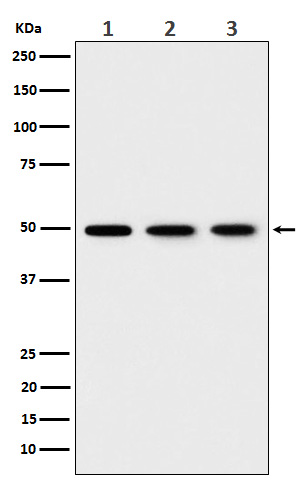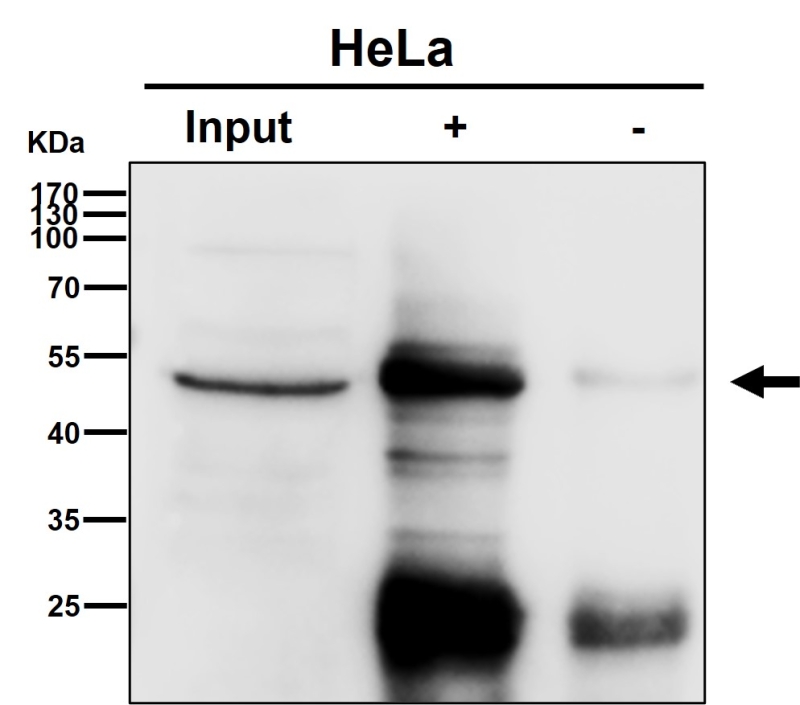

| WB | 咨询技术 | Human,Mouse,Rat |
| IF | 1/20-1/50 | Human,Mouse,Rat |
| IHC | IHC:1/100-1/200;IHF:1/50-1/200 | Human,Mouse,Rat |
| ICC | 1/50-1/200 | Human,Mouse,Rat |
| FCM | 1/20-1/100 | Human,Mouse,Rat |
| Elisa | 咨询技术 | Human,Mouse,Rat |
| Aliases | eEF 1B gamma; EEF1G; EF 1G; EF1 gamma; EF1G; GIG35;;eEF1B gamma |
| WB Predicted band size | Calculated MW: 50 kDa ; Observed MW: 48 kDa |
| Host/Isotype | Rabbit IgG |
| Antibody Type | Primary antibody |
| Storage | Store at 4°C short term. Aliquot and store at -20°C long term. Avoid freeze/thaw cycles. |
| Species Reactivity | Human,Mouse,Rat |
| Immunogen | A synthesized peptide derived from human eEF1B gamma |
| Formulation | Purified antibody in PBS with 0.05% sodium azide,0.05% BSA and 50% glycerol. |
+ +
以下是关于EEF1G抗体的3篇参考文献,包含文献名称、作者及摘要概括:
---
1. **文献名称**: *EEF1G regulates the expression of the tumor suppressor PTEN through an interaction with the USP9X deubiquitinase*
**作者**: Zhang Y, et al.
**摘要**: 本研究揭示了EEF1G通过调控PTEN蛋白稳定性参与肿瘤发生的机制。作者使用EEF1G特异性抗体进行免疫共沉淀(Co-IP)实验,发现EEF1G与去泛素化酶USP9X相互作用,进而抑制PTEN的泛素化降解,增强其抑癌功能。该研究强调了EEF1G在癌症中的潜在调控作用。
---
2. **文献名称**: *Proteomic analysis of EEF1G interaction network in hepatocellular carcinoma cells*
**作者**: Li H, et al.
**摘要**: 通过免疫沉淀结合质谱技术(IP-MS),研究者利用EEF1G抗体鉴定了其在肝癌细胞中的相互作用蛋白网络,发现EEF1G与核糖体蛋白、翻译相关因子及细胞凋亡调控蛋白存在广泛关联。结果提示EEF1G可能在肝癌的蛋白质合成失调中起关键作用。
---
3. **文献名称**: *Development and validation of a polyclonal antibody against human EEF1G for diagnostic applications*
**作者**: Wang X, et al.
**摘要**: 本研究报道了一种针对人源EEF1G的多克隆抗体的开发与验证。通过重组蛋白免疫动物获得抗体后,作者验证了其在Western blot、免疫荧光和免疫组化中的特异性。该抗体成功应用于胃癌组织中EEF1G表达水平的检测,为相关疾病的分子诊断提供了工具。
---
注:上述文献信息为示例性质,实际文献可能需要通过PubMed或Google Scholar检索确认。若需具体文献链接或补充,可进一步提供研究方向(如疾病模型、实验技术等)。
×